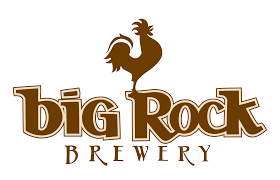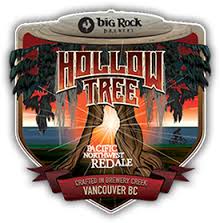 My CBC beer column last week centred around the news of the resignation of Big Rock CEO Bob Sartor. It was somewhat surprising news and it got me wondering what might this mean for Alberta’s oldest and largest craft brewery. You can listen to the column here.
My CBC beer column last week centred around the news of the resignation of Big Rock CEO Bob Sartor. It was somewhat surprising news and it got me wondering what might this mean for Alberta’s oldest and largest craft brewery. You can listen to the column here.
For those not familiar with Big Rock’s long and winding history, I start with a short synopsis of their roots, their various trials and tribulations over the years and how they got to where they are now. In particular I focus on how as a pioneer of craft brewing in Canada they fell prey to their own success. A big expansion, designed for a failed attempt to woo the American market, created a dilemma for the company. They had a huge brewhouse that they needed to keep busy. This logic led them during the 2000s down a path that, in hindsight, might not have been advisable.
They started seeking greater market share through a variety of means. They started chasing the pale lager market, releasing a series of uninspiring lagers in an attempt to woo Labatt and Molson drinkers. They also pushed into the discount beer segment with Alberta Genuine Draft and creating a whole host of “house beer” for bars and restaurants (beer that sells for less and is branded for the bar, rather than the brewery). They also achieved national distribution and became one of Canada’s largest independent breweries.
Along the way their craft credentials took a big hit. Newer microbreweries passed them and Big Rock found itself stuck, well, between a rock and hard place.
Sartor’s arrival marked a significant shift for the company. During his four-year tenure Big Rock has tried very hard to re-establish their craft beer credibility. They dropped their efforts to court the mainstream market (or, maybe, they recognized that craft is becoming more mainstream) and stopped chasing the same fads the big boys constantly chase. They have de-emphasized (but not halted) their production of discount beer and house brands. Instead they have increased their efforts around creating interesting seasonals and one-offs and have expanded their line-up to include more “craft” like styles, like Scottish ale, dunkelweizen and even a single-hop IPA.
 The results of this effort have been mixed, both in terms of the beer and the reaction from the consumer. I think Big Rock has made great strides in repairing its relationships within the industry, but at times the beer drinker can be stubborn and slow to forgive. I truly am not sure where their reputation sits these days. Definitely improved, but I just don’t know by how much.
The results of this effort have been mixed, both in terms of the beer and the reaction from the consumer. I think Big Rock has made great strides in repairing its relationships within the industry, but at times the beer drinker can be stubborn and slow to forgive. I truly am not sure where their reputation sits these days. Definitely improved, but I just don’t know by how much.
So, going forward, what does the future hold for Big Rock? I, obviously, have no insider information but I think they are at a fork in the road. New CEOs usually mean a new course, even if fairly subtle, for a company. Profits have been down in recent years, what with rebranding costs and lower production volumes. The shareholders may be restless and see this transition as an opportunity to shore stock value back up. Conversely the next CEO might double down on the repairing craft credentials project.
Both paths are fraught with risks. Going back to chasing volume could leave Big Rock in the same no-person’s-land they were in a few years ago; rejected by craft beer drinkers but slow to be adopted by commercial beer drinkers. But the craft world is becoming increasingly competitive and challenging, so that option is no walk in the park either. It is moving very, very fast. Is a brewery the size of Big Rock able to be nimble enough to keep pace? I don’t know.
What I am fairly certain of is Big Rock will look quite different a couple of years from now than it does today. I will be watching with great interest.

December 2, 2016 at 9:30 AM
With Big Rock Urban, and the one that recently opened up in Ontario there will be some interesting ideas coming forth. They have been doing Collaborations beers with Last Best and with Jody out of Vancouver making some very good quality beers and them bringing them and making them in Calgary they are trying to expand the market.
Don’t forget as well that they did fail a while back in Whistler and when they left Whistler Brewing bought the place they walked away from too back in the day.
I have been reviewing beers from them since they made the Rye and Ginger a few years back and I have seen them grow with Paul at the Brewmasters Position. Having a marketing person like Susanne Fox too does keep the interest going and she brings some great ideas as well as some TV fame with her too.
As for the next CEO… he really has big shoes to fill, but I’m sure they will try to keep things going for the beer they are making in Van and hopefully have some success in Toronto as well. I have a feeling there might be some push back by the senior staff there and hopefully compromises will be made instead of people leaving over hurt feelings.
I’m also seeing a sour project coming soon too from Big Rock as Paul did go and have some fun learning about making sour barrel aged beers, and they do have a sour that is being introduced as a one of for the Craft Cellar sale this weekend that I think might be received with some optimism.
December 2, 2016 at 8:48 PM
The next CEO a he? The interim CEO is Barb Feit. Big Rock could do much much worse. I’ve met few in this industry that can match her insight.
December 2, 2016 at 10:19 PM
I have been a beer drinker for a long time and followed Big Rocks progress and success since day one and that’s what made me a customer. However as the article states and it was obvious in the past years that bigger is a death sentence (saw this coming) with the other Micro breweries making a significant impact. I guess what I’m saying is listen to your customers so to speak. Great article. Thanks
December 4, 2016 at 2:06 PM
Food for thought:
1. Private label/contract brewing. Sartor’s comments several financial quarters ago when he took over as CEO was to dismiss BR unprofitable private label brewing agreements and indicated a direction to get out of this side of the business as soon as these contracts expired. Today he has reversed course and fully embraces and touts private label/price brands as they now represent about 55% of their volume and is key to their survival.
2. Core brands. Their core brands continue to decline and the business rationale/cost of launching 24 new brands per year is IMO questionable and fragments their focus/resources as the financials clearly demonstrate. Yes continue to bring new ideas and beer styles to market but there must be a balance.
3. AGLC tax – latest NDP tax change has effectively saved BR for the short term. But who can predict what will happen given current legal challenges to this tax and possible government change in 3 years at the next election with consumers frustration with NDP policy (carbon tax, economy etc).
4. Financials – BR burned through a 2014 private stock placement of $13.6 M from Cormark Financial at $17/share. Their current expansion strategy is 100% bank debt financed and is at $7M + and increasing. BR Urban results/financial contribution to date is not great and the cost/financial impact of entering Ontario market has yet to be demonstrated.
5. Take Over – about 45% of shares are held by board of directors. The stock is tightly held and thinly traded and currently trades in the $6.00 range. Challenges include AGLC tax/NDP policy, high bank debt, declining core brand volume/brand value, highly competitive and fragmented craft segment, fragmented consumer brand loyalty, high % of low margin discount/private label brands, current expansion strategy/success/cost,and so on. Is a larger brewer prepared to pay a premium to current stock price given market challenges and what effectively are they buying. AGLC tax is based upon world wide brewery production so the tax break enjoyed by BR and the concurrent business model would be eliminated.
December 4, 2016 at 2:39 PM
Interesting observations, Alan. Thanks for your insight. Indeed, lots of questions regarding their future. Will be interesting to watch.
December 4, 2016 at 9:48 PM
BR was the first brewery to introduce me to flavourful beer back around ’95. They were leaders of craft beer in Albeerta for years… but now it seems like they are continually trying to catch up with trends and misfiring on trailblazing attempts (the barrel aged box set a few years ago,and more recently Mosaic lager to name a few duds). I haven’t had a chance to try it yet, but my hopes are buoyed up by your positive assessment of Hollow Tree. I like good beer: so make some more good beer and I will buy it.